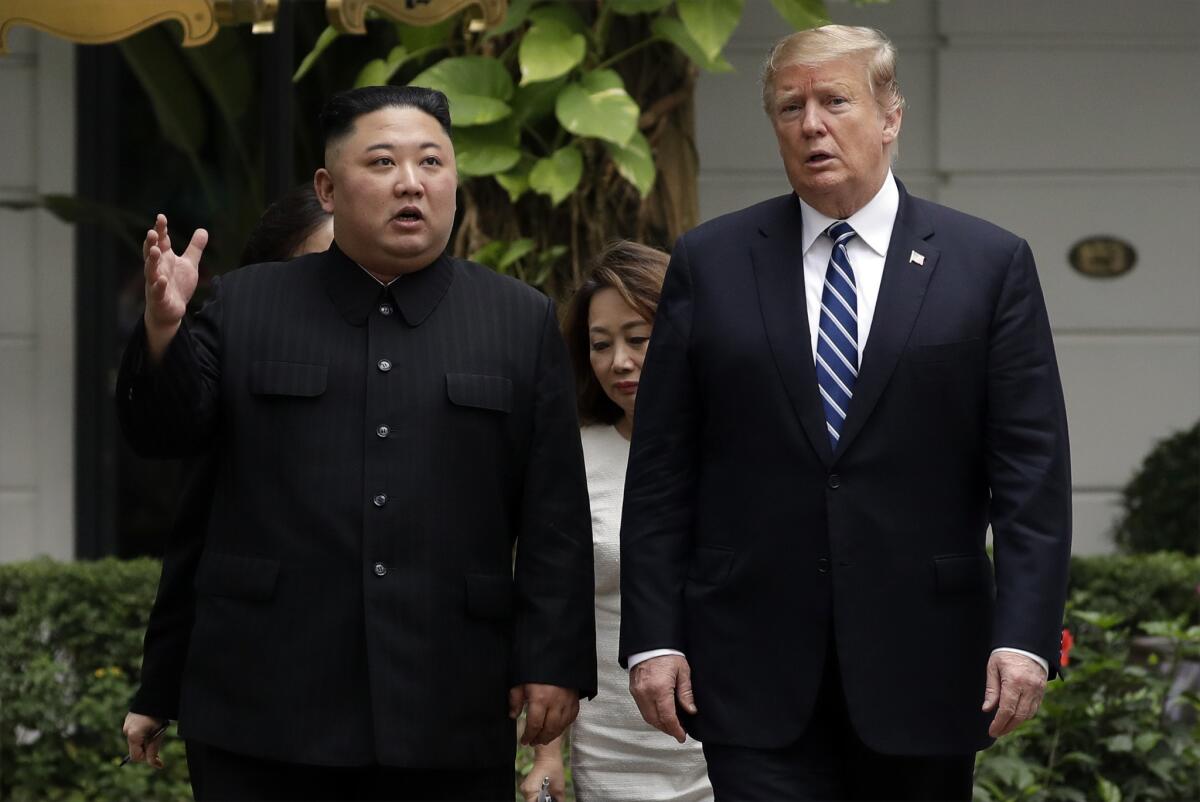North Korea suggests it might lift weapons test moratorium

- Share via
PYONGYANG, North Korea — North Korea on Tuesday suggested it might call off its 20-month suspension of nuclear and missile tests because of summertime U.S.-South Korean military drills that the North calls preparation for an eventual invasion.
The statement by the North’s Foreign Ministry comes during a general deadlock in nuclear talks, but after an extraordinary meeting of the U.S. and North Korean leaders at the Korean border that raised hopes that negotiations would soon resume.
The comments ramp up pressure on the United States ahead of any new talks.
North Korea has had long-standing antipathy toward U.S.-South Korean military cooperation, which the allies call defensive and routine but which the North sees as hostile.
At his June 30 meeting with North Korean leader Kim Jong Un, President Trump crossed the border dividing North and South Korea, becoming the first sitting U.S. president to set foot in North Korean territory. The leaders agreed in closed-door talks to resume nuclear diplomacy that had been stalled since their failed, second summit — in Vietnam — in February.
Despite the seeming mini-breakthrough, there has been little public progress since. North Korea wants widespread relief from harsh U.S.-led sanctions in return for pledging to give up parts of its weapons program, but the United States is demanding greater steps toward disarmament before it agrees to relinquish the leverage provided by the sanctions.
Amid the diplomatic jockeying, North Korea said Tuesday that expected regular summertime U.S.-South Korean military drills are forcing it to rethink whether to remain committed to the promises it has made to the United States. It cited its moratorium on nuclear and missile tests and other steps aimed at improving ties with Washington.
The statement said Trump vowed to suspend military drills with South Korea during his first and third meetings with Kim, but the expected summertime drills with Seoul and the deployment of weapons in the South show that Washington is not fulfilling that promise.
“With the U.S. unilaterally reneging on its commitments, we are gradually losing our justifications to follow through on the commitments we made with the U.S. as well,” said the statement, carried by the North’s official Korean Central News Agency.
It also said it is not bound by any legal documents to suspend its nuclear and missile tests.
Later Tuesday, the Foreign Ministry issued another statement warning that it will wait to see if the U.S.-South Korea military drills take place to decide on the fate of North Korea-U.S. nuclear diplomacy.
Since the first Trump-Kim meeting, held in Singapore last year, the U.S. and South Korea have suspended or downsized their annual military drills. South Korea’s Foreign Ministry said Tuesday that the allies have decided to terminate their normal summertime Freedom Guardian drills and are discussing holding other kinds of drills instead.
The ministry said it hopes that talks between North Korea and the U.S. will resume soon.
Since it conducted the third of its three intercontinental ballistic missile tests in November 2017, North Korea hasn’t tested any long-range missiles potentially capable of reaching the U.S. mainland. After entering talks with Washington, Kim suspended nuclear and long-range missile tests, allowing Trump to boast of an achievement in his North Korea policy.
South Korea’s National Intelligence Service, the country’s main spy agency, told lawmakers in a private briefing Tuesday that there were no suspicious activities at North Korea’s main long-range rocket launch site in the northwest and at its missile research center on the outskirts of Pyongyang, according to Kim Min-ki, one of the lawmakers who attended the briefing.
Outside experts say North Korea has suggested that it could further put off or cancel the resumption of nuclear talks if the United States doesn’t offer to accept its calls for a slow, step-by-step nuclear disarmament process or widespread sanctions relief. But some analysts say North Korea will eventually return to the talks because Kim wants cooperation with outside powers as part of a plan to revive his country’s troubled economy.
More to Read
Sign up for Essential California
The most important California stories and recommendations in your inbox every morning.
You may occasionally receive promotional content from the Los Angeles Times.










